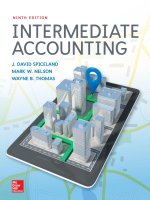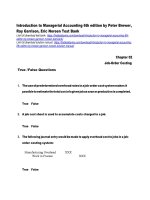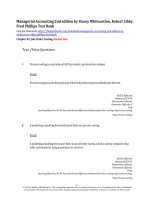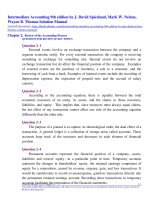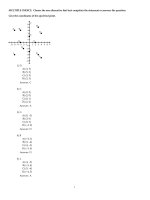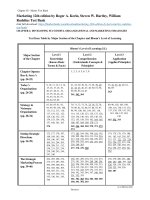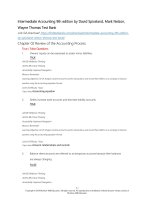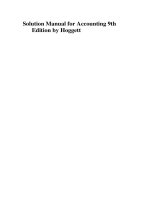Intermediate accounting 9th edition by spiceland nelson thomas test bank
Bạn đang xem bản rút gọn của tài liệu. Xem và tải ngay bản đầy đủ của tài liệu tại đây (2.11 MB, 121 trang )
Intermediate Accounting 9th edition by David Spiceland, Mark Nelson,
Wayne Thomas Test Bank
Link full download: />
Chapter 02 Review of the Accounting Process
True / False Questions
1.
Owners' equity can be expressed as assets minus liabilities.
TRUE
AACSB: Reflective Thinking
AICPA: BB Critical Thinking
Accessibility: Keyboard Navigation
Blooms: Remember
Learning Objective: 02-01 Analyze routine economic events-transactions-and record their effects on a company's financial
position using the accounting equation format.
Level of Difficulty: 1 Easy
Topic Area: Accounting equation
2.
Debits increase asset accounts and decrease liability accounts.
TRUE
AACSB: Reflective Thinking
AICPA: BB Critical Thinking
Accessibility: Keyboard Navigation
Blooms: Remember
Learning Objective: 02-01 Analyze routine economic events-transactions-and record their effects on a company's financial
position using the accounting equation format.
Level of Difficulty: 1 Easy
Topic Area: Account relationships and records
3.
Balance sheet accounts are referred to as temporary accounts because their balances
are always changing
FALSE
AACSB: Reflective Thinking
AICPA: BB Critical Thinking
Accessibility: Keyboard Navigation
2-1
Copyright © 2018 McGraw-Hill Education. All rights reserved. No reproduction or distribution without the prior written consent of
McGraw-Hill Education.
Blooms: Remember
Learning Objective: 02-01 Analyze routine economic events-transactions-and record their effects on a company's financial
position using the accounting equation format.
Level of Difficulty: 1 Easy
Topic Area: Account relationships and records
4.
After an unadjusted trial balance is prepared, the next step in the accounting processing cycle
is the preparation of financial statements
FALSE
AACSB: Reflective Thinking
AICPA: BB Critical Thinking
Accessibility: Keyboard Navigation
Blooms: Remember
Learning Objective: 02-01 Analyze routine economic events-transactions-and record their effects on a company's financial
position using the accounting equation format.
Level of Difficulty: 1 Easy
Topic Area: Accounting processing cycle steps
5.
Adjusting journal entries are recorded at the end of any period when financial statements
are prepared.
TRUE
AACSB: Reflective Thinking
AICPA: BB Critical Thinking
Accessibility: Keyboard Navigation
Blooms: Remember
Learning Objective: 02-04 Identify and describe the different types of adjusting journal entries.
Level of Difficulty: 1 Easy
Topic Area: Analyze updating-Record adjusting entry
6.
Accruals occur when the cash flow precedes either revenue or expense recognition.
FALSE
AACSB: Reflective Thinking
AICPA: BB Critical Thinking
Accessibility: Keyboard Navigation
Blooms: Remember
Learning Objective: 02-04 Identify and describe the different types of adjusting journal entries.
2-2
Copyright © 2018 McGraw-Hill Education. All rights reserved. No reproduction or distribution without the prior written consent of
McGraw-Hill Education.
Level of Difficulty: 1 Easy
Topic Area: Analyze updating-Identify type of adjustment
7.
The adjusted trial balance contains only permanent accounts.
FALSE
AACSB: Reflective Thinking
AICPA: BB Critical Thinking
Accessibility: Keyboard Navigation
Blooms: Remember
Learning Objective: 02-05 Record adjusting journal entries in general journal format; post entries; and prepare an adjusted trial
balance.
Level of Difficulty: 1 Easy
Topic Area: Trial balance―Adjusted
8.
The income statement summarizes the operating activity of a firm at a particular point in time.
FALSE
AACSB: Reflective Thinking
AICPA: BB Critical Thinking
AICPA: FN Measurement
Accessibility: Keyboard Navigation
Blooms: Remember
Learning Objective: 02-06 Describe the four basic financial statements.
Level of Difficulty: 1 Easy
Topic Area: Financial statement―Income Statement
9.
The balance sheet can be considered a change or flow statement.
FALSE
AACSB: Reflective Thinking
AICPA: BB Critical Thinking
AICPA: FN Measurement
Accessibility: Keyboard Navigation
Blooms: Remember
Learning Objective: 02-06 Describe the four basic financial statements.
Level of Difficulty: 1 Easy
Topic Area: Financial statement―Balance sheet
2-3
Copyright © 2018 McGraw-Hill Education. All rights reserved. No reproduction or distribution without the prior written consent of
McGraw-Hill Education.
10.
The statement of cash flows summarizes transactions that caused cash to change during a
reporting period.
TRUE
AACSB: Reflective Thinking
AICPA: BB Critical Thinking
AICPA: FN Measurement
Accessibility: Keyboard Navigation
Blooms: Remember
Learning Objective: 02-06 Describe the four basic financial statements.
Level of Difficulty: 1 Easy
Topic Area: Financial statement―Cash flow
11.
The statement of shareholders' equity discloses the changes in the temporary
shareholders' equity accounts.
FALSE
AACSB: Reflective Thinking
AICPA: BB Critical Thinking
AICPA: FN Measurement
Accessibility: Keyboard Navigation
Blooms: Remember
Learning Objective: 02-06 Describe the four basic financial statements.
Level of Difficulty: 2 Medium
Topic Area: Financial statement―Shareholders equity
12.
The post-closing trial balance contains only permanent accounts.
TRUE
AACSB: Reflective Thinking
AICPA: BB Critical Thinking
Accessibility: Keyboard Navigation
Blooms: Remember
Learning Objective: 02-07 Explain the closing process.
Level of Difficulty: 1 Easy
Topic Area: The closing process
2-4
Copyright © 2018 McGraw-Hill Education. All rights reserved. No reproduction or distribution without the prior written consent of
McGraw-Hill Education.
13.
The closing process brings all temporary accounts to a zero balance and updates the balance
in the retained earnings account.
TRUE
AACSB: Reflective Thinking
AICPA: BB Critical Thinking
Accessibility: Keyboard Navigation
Blooms: Remember
Learning Objective: 02-07 Explain the closing process.
Level of Difficulty: 1 Easy
Topic Area: The closing process
14.
A reversing entry at the beginning of a period for salaries would include a debit to salaries
expense.
FALSE
AACSB: Reflective Thinking
AICPA: BB Critical Thinking
Accessibility: Keyboard Navigation
Blooms: Remember
Learning Objective: 02-Appendix 2B Reversing Entries.
Level of Difficulty: 2 Medium
Topic Area: Reversing entries–Appendix B
15.
The sale of merchandise on account would be recorded in a sales journal.
TRUE
AACSB: Reflective Thinking
AICPA: BB Critical Thinking
Accessibility: Keyboard Navigation
Blooms: Remember
Learning Objective: 02-Appendix 2C Subsidiary Ledgers and Special Journals.
Level of Difficulty: 1 Easy
Topic Area: Subsidiary ledger-Special journal–App C
2-5
Copyright © 2018 McGraw-Hill Education. All rights reserved. No reproduction or distribution without the prior written consent of
McGraw-Hill Education.
16.
The payment of cash to a supplier would be recorded in a purchases journal.
FALSE
AACSB: Reflective Thinking
AICPA: BB Critical Thinking
Accessibility: Keyboard Navigation
Blooms: Remember
Learning Objective: 02-Appendix 2C Subsidiary Ledgers and Special Journals.
Level of Difficulty: 1 Easy
Topic Area: Subsidiary ledger-Special journal–App C
Multiple Choice Questions
17.
The accounting equation can be stated as:
A. A + L − OE = 0.
B. A − L + OE = 0.
C. -A + L − OE = 0.
D. A − L − OE = 0.
AACSB: Reflective Thinking
AICPA: BB Critical Thinking
Accessibility: Keyboard Navigation
Blooms: Remember
Learning Objective: 02-01 Analyze routine economic events-transactions-and record their effects on a company's financial
position using the accounting equation format.
Level of Difficulty: 2 Medium
Topic Area: Accounting equation
2-6
Copyright © 2018 McGraw-Hill Education. All rights reserved. No reproduction or distribution without the prior written consent of
McGraw-Hill Education.
18.
Examples of external transactions include all of the following except:
A. Paying employee salaries.
B. Purchasing equipment.
C. Depreciating equipment.
D. Collecting a receivable.
AACSB: Reflective Thinking
AICPA: BB Critical Thinking
Accessibility: Keyboard Navigation
Blooms: Understand
Learning Objective: 02-01 Analyze routine economic events-transactions-and record their effects on a company's financial
position using the accounting equation format.
Level of Difficulty: 2 Medium
Topic Area: Analyze transaction-Record journal entry
19.
Examples of internal transactions include all of the following except:
A. Writing off an uncollectible account.
B. Recording the expiration of prepaid insurance.
C. Recording unpaid salaries.
D. Paying salaries to company employees.
AACSB: Reflective Thinking
AICPA: BB Critical Thinking
Accessibility: Keyboard Navigation
Blooms: Understand
Learning Objective: 02-01 Analyze routine economic events-transactions-and record their effects on a company's financial
position using the accounting equation format.
Learning Objective: 02-05 Record adjusting journal entries in general journal format; post entries; and prepare an adjusted trial
balance.
Level of Difficulty: 2 Medium
Topic Area: Analyze transaction-Record journal entry
Topic Area: Analyze updating-Record adjusting entry
2-7
Copyright © 2018 McGraw-Hill Education. All rights reserved. No reproduction or distribution without the prior written consent of
McGraw-Hill Education.
20.
XYZ Corporation receives $100,000 from investors for issuing them shares of its stock.
XYZ's journal entry to record this transaction would include a:
A. Debit to investments.
B. Credit to retained earnings.
C. Credit to common stock.
D. Credit to revenue.
AACSB: Analytical Thinking
AICPA: BB Critical Thinking
AICPA: FN Measurement
Accessibility: Keyboard Navigation
Blooms: Analyze
Learning Objective: 02-02 Record transactions using the general journal format.
Level of Difficulty: 2 Medium
Topic Area: Analyze transaction-Record journal entry
21.
Incurring an expense for advertising on account would be recorded by:
A. Debiting liabilities.
B. Crediting assets.
C. Debiting an expense.
D. Debiting assets.
AACSB: Analytical Thinking
AICPA: BB Critical Thinking
AICPA: FN Measurement
Accessibility: Keyboard Navigation
Blooms: Analyze
Learning Objective: 02-02 Record transactions using the general journal format.
Level of Difficulty: 2 Medium
Topic Area: Analyze transaction-Record journal entry
2-8
Copyright © 2018 McGraw-Hill Education. All rights reserved. No reproduction or distribution without the prior written consent of
McGraw-Hill Education.
22.
A sale on account would be recorded by:
A. Debiting revenue.
B. Crediting assets.
C. Crediting liabilities.
D. Debiting assets.
AACSB: Analytical Thinking
AICPA: BB Critical Thinking
AICPA: FN Measurement
Accessibility: Keyboard Navigation
Blooms: Analyze
Learning Objective: 02-02 Record transactions using the general journal format.
Level of Difficulty: 2 Medium
Topic Area: Analyze transaction-Record journal entry
23.
Mary Parker Co. invested $15,000 in ABC Corporation and received common stock in
exchange. Mary Parker Co.'s journal entry to record this transaction would include a:
A. Debit to investments.
B. Credit to retained earnings.
C. Credit to common stock.
D. Debit to expense.
AACSB: Analytical Thinking
AICPA: BB Critical Thinking
AICPA: FN Measurement
Accessibility: Keyboard Navigation
Blooms: Analyze
Learning Objective: 02-02 Record transactions using the general journal format.
Level of Difficulty: 2 Medium
Topic Area: Analyze transaction-Record journal entry
2-9
Copyright © 2018 McGraw-Hill Education. All rights reserved. No reproduction or distribution without the prior written consent of
McGraw-Hill Education.
24.
Hughes Aircraft sold a four-passenger airplane for $380,000, receiving a $50,000 down payment
and a 12% note for the balance. The journal entry to record this sale would include a:
A. Credit to cash.
B. Debit to cash discount.
C. Debit to note receivable.
D. Credit to note receivable.
AACSB: Analytical Thinking
AICPA: BB Critical Thinking
AICPA: FN Measurement
Accessibility: Keyboard Navigation
Blooms: Analyze
Learning Objective: 02-02 Record transactions using the general journal format.
Level of Difficulty: 3 Hard
Topic Area: Analyze transaction-Record journal entry
25.
Somerset Leasing received $12,000 for 24 months' rent in advance. How should
Somerset record this transaction?
A.
Prepaid rent
12,000
Rent expense
B.
Cash
12,000
12,000
Deferred revenue
C.
Interest expense
12,000
12,000
Interest payable
D.
Salaries expense
12,000
12,000
Salaries payable
12,000
AACSB: Analytical Thinking
AICPA: BB Critical Thinking
AICPA: FN Measurement
Blooms: Analyze
Learning Objective: 02-02 Record transactions using the general journal format.
Level of Difficulty: 2 Medium
Topic Area: Analyze transaction-Record journal entry
2-10
Copyright © 2018 McGraw-Hill Education. All rights reserved. No reproduction or distribution without the prior written consent of
McGraw-Hill Education.
26.
Davis Hardware Company uses a perpetual inventory system. How should Davis record the
sale of merchandise, costing $620, and sold on account for $960?
A.
Inventory
620
Accounts receivable
Sales
620
960
Revenue from sales
B.
Accounts receivable
960
960
Sales revenue
Cost of goods sold
960
620
Inventory
C.
620
Inventory
620
Gain on sale
340
Sales revenue
D.
Accounts receivable
960
960
Sales revenue
620
Gain on sale
340
AACSB: Analytical Thinking
AICPA: BB Critical Thinking
AICPA: FN Measurement
Blooms: Analyze
Learning Objective: 02-02 Record transactions using the general journal format.
Level of Difficulty: 3 Hard
Topic Area: Analyze transaction-Record journal entry
2-11
Copyright © 2018 McGraw-Hill Education. All rights reserved. No reproduction or distribution without the prior written consent of
McGraw-Hill Education.
27.
Ace Bonding Company purchased merchandise inventory on account. The inventory
costs $2,000 and is expected to sell for $3,000. How should Ace record the purchase?
A.
Inventory
2,000
Accounts payable
B.
2,000
Cost of goods sold
2,000
Deferred revenue
1,000
Sales in advance
C.
Cost of goods sold
3,000
2,000
Inventory payable
D.
2,000
Cost of goods sold
2,000
Profit
1,000
Sales payable
3,000
AACSB: Analytical Thinking
AICPA: BB Critical Thinking
AICPA: FN Measurement
Blooms: Analyze
Learning Objective: 02-02 Record transactions using the general journal format.
Level of Difficulty: 3 Hard
Topic Area: Analyze transaction-Record journal entry
28.
Which of the following accounts has a balance whereby debits normally exceed credits?
A. Accounts payable.
B. Accrued taxes.
C. Accumulated depreciation.
D. Advertising expense.
AACSB: Reflective Thinking
AICPA: BB Critical Thinking
Accessibility: Keyboard Navigation
Blooms: Remember
Learning Objective: 02-01 Analyze routine economic events-transactions-and record their effects on a company's financial
position using the accounting equation format.
Learning Objective: 02-05 Record adjusting journal entries in general journal format; post entries; and prepare an adjusted trial
balance.
Learning Objective: 02-03 Post the effects of journal entries to general ledger accounts and prepare an unadjusted trial balance.
Level of Difficulty: 1 Easy
2-12
Copyright © 2018 McGraw-Hill Education. All rights reserved. No reproduction or distribution without the prior written consent of
McGraw-Hill Education.
Topic Area: Account relationships and records
Topic Area: Determine account balance-Analyze entries
29.
An example of a contra account is:
A. Depreciation expense.
B. Accounts receivable.
C. Sales revenue.
D. Accumulated depreciation.
AACSB: Reflective Thinking
AICPA: BB Critical Thinking
Accessibility: Keyboard Navigation
Blooms: Remember
Learning Objective: 02-04 Identify and describe the different types of adjusting journal entries.
Level of Difficulty: 1 Easy
Topic Area: Analyze updating-Identify type of adjustment
30.
Making insurance payments in advance is an example of:
A. An accrued receivable transaction.
B. An accrued liability transaction.
C. A deferred revenue transaction.
D. A prepaid expense transaction.
AACSB: Reflective Thinking
AICPA: BB Critical Thinking
Accessibility: Keyboard Navigation
Blooms: Understand
Learning Objective: 02-02 Record transactions using the general journal format.
Learning Objective: 02-04 Identify and describe the different types of adjusting journal entries.
Level of Difficulty: 1 Easy
Topic Area: Analyze transaction-Record journal entry
Topic Area: Analyze updating-Identify type of adjustment
2-13
Copyright © 2018 McGraw-Hill Education. All rights reserved. No reproduction or distribution without the prior written consent of
McGraw-Hill Education.
31.
Recording revenue before it is collected is an example of:
A. A prepaid expense transaction.
B. A deferred revenue transaction.
C. An accrued liability transaction.
D. An accrued receivable transaction.
AACSB: Reflective Thinking
AICPA: BB Critical Thinking
Accessibility: Keyboard Navigation
Blooms: Understand
Learning Objective: 02-04 Identify and describe the different types of adjusting journal entries.
Level of Difficulty: 1 Easy
Topic Area: Analyze updating-Identify type of adjustment
32.
When a magazine company collects cash for selling a subscription, it is an example of:
A. An accrued liability transaction.
B. An accrued receivable transaction.
C. A prepaid expense transaction.
D. A deferred revenue transaction.
AACSB: Reflective Thinking
AICPA: BB Critical Thinking
Accessibility: Keyboard Navigation
Blooms: Understand
Learning Objective: 02-02 Record transactions using the general journal format.
Learning Objective: 02-04 Identify and describe the different types of adjusting journal entries.
Level of Difficulty: 1 Easy
Topic Area: Analyze transaction-Record journal entry
Topic Area: Analyze updating-Identify type of adjustment
2-14
Copyright © 2018 McGraw-Hill Education. All rights reserved. No reproduction or distribution without the prior written consent of
McGraw-Hill Education.
33.
On December 31, 2017, Coolwear, Inc. had a balance in its prepaid insurance account of
$48,400. During 2018, $86,000 was paid for insurance. At the end of 2018, after adjusting entries
were recorded, the balance in the prepaid insurance account was 42,000. Insurance expense for
2018 would be:
A. $6,400.
B. $134,400.
C. $86,000.
D. $92,400.
Feedback: Insurance expense = $48,400 + 86,000 − 42,000 = $92,400
AACSB: Analytical Thinking
AICPA: BB Critical Thinking
AICPA: FN Measurement
Accessibility: Keyboard Navigation
Blooms: Analyze
Learning Objective: 02-05 Record adjusting journal entries in general journal format; post entries; and prepare an adjusted trial
balance.
Learning Objective: 02-08 Convert from cash basis net income to accrual basis net income.
Level of Difficulty: 2 Medium
Topic Area: Analyze updating-Record adjusting entry
Topic Area: Determine account balance-Analyze entries
34.
Adjusting entries are primarily needed for:
A. Cash basis accounting.
B. Accrual accounting.
C. Current value accounting.
D. Manual accounting systems.
AACSB: Reflective Thinking
AICPA: BB Critical Thinking
AICPA: BB Critical Thinking
Accessibility: Keyboard Navigation
Blooms: Remember
Learning Objective: 02-04 Identify and describe the different types of adjusting journal entries.
Level of Difficulty: 1 Easy
2-15
Copyright © 2018 McGraw-Hill Education. All rights reserved. No reproduction or distribution without the prior written consent of
McGraw-Hill Education.
Topic Area: Analyze updating-Identify type of adjustment
35.
Prepayments occur when:
A. Cash flow precedes expense recognition.
B. Sales are delayed pending credit approval.
C. Customers are unable to pay the full amount due when goods are delivered.
D. Manufactured goods await quality control inspections.
AACSB: Reflective Thinking
AICPA: BB Critical Thinking
Accessibility: Keyboard Navigation
Blooms: Remember
Learning Objective: 02-04 Identify and describe the different types of adjusting journal entries.
Level of Difficulty: 2 Medium
Topic Area: Analyze updating-Identify type of adjustment
36.
Accruals occur when cash flows:
A. Occur before expense recognition.
B. Occur after revenue or expense recognition.
C. Are uncertain.
D. May be substituted for goods or services.
AACSB: Reflective Thinking
AICPA: BB Critical Thinking
Accessibility: Keyboard Navigation
Blooms: Remember
Learning Objective: 02-04 Identify and describe the different types of adjusting journal entries.
Level of Difficulty: 2 Medium
Topic Area: Analyze updating-Identify type of adjustment
2-16
Copyright © 2018 McGraw-Hill Education. All rights reserved. No reproduction or distribution without the prior written consent of
McGraw-Hill Education.
37.
On December 31, 2018, the end of Larry's Used Cars' first year of operations, the accounts
receivable was $53,600. The company estimates that $1,200 of the year-end receivables will not
be collected. Accounts receivable in the 2018 balance sheet will be valued at:
A. $53,600.
B. $54,800.
C. $52,400.
D. $1,200.
Feedback: Accounts receivable = $53,600 − 1,200 = $52,400
AACSB: Analytical Thinking
AICPA: BB Critical Thinking
AICPA: FN Measurement
Accessibility: Keyboard Navigation
Blooms: Analyze
Learning Objective: 02-04 Identify and describe the different types of adjusting journal entries.
Learning Objective: 02-05 Record adjusting journal entries in general journal format; post entries; and prepare an adjusted trial
balance.
Level of Difficulty: 2 Medium
Topic Area: Analyze updating-Identify type of adjustment
Topic Area: Trial balance―Adjusted
2-17
Copyright © 2018 McGraw-Hill Education. All rights reserved. No reproduction or distribution without the prior written consent of
McGraw-Hill Education.
38.
Cal Farms reported supplies expense of $2,000,000 this year. The supplies account decreased
by $200,000 during the year to an ending balance of $400,000. What was the cost of
supplies the Cal Farms purchased during the year?
A. $1,600,000.
B. $1,800,000.
C. $2,200,000.
D. $2,400,000.
Feedback:
Supplies
Bal. 600,000
?
2,000,000
Bal. 400,000
Supplies purchases: $400,000 + 2,000,000 − 600,000 = $1,800,000
AACSB: Analytical Thinking
AICPA: BB Critical Thinking
AICPA: FN Measurement
Blooms: Analyze
Learning Objective: 02-05 Record adjusting journal entries in general journal format; post entries; and prepare an adjusted trial
balance.
Learning Objective: 02-08 Convert from cash basis net income to accrual basis net income.
Level of Difficulty: 2 Medium
Topic Area: Determine account balance-Analyze entries
2-18
Copyright © 2018 McGraw-Hill Education. All rights reserved. No reproduction or distribution without the prior written consent of
McGraw-Hill Education.
39.
Which of the following is not an adjusting entry?
A.
Prepaid rent Rent
expense
B.
Cash
Deferred revenue
C.
Interest expense
Interest payable
D.
Salaries expense
Salaries payable
AACSB: Analytical Thinking
AICPA: BB Critical Thinking
AICPA: FN Measurement
Blooms: Analyze
Learning Objective: 02-05 Record adjusting journal entries in general journal format; post entries; and prepare an adjusted trial
balance.
Level of Difficulty: 2 Medium
Topic Area: Analyze updating-Record adjusting entry
40.
The adjusting entry required when amounts previously recorded as deferred revenues
are recognized includes:
A. A debit to a liability.
B. A debit to an asset.
C. A credit to a liability.
D. A credit to an asset.
AACSB: Analytical Thinking
AICPA: BB Critical Thinking
Accessibility: Keyboard Navigation
Blooms: Analyze
Learning Objective: 02-05 Record adjusting journal entries in general journal format; post entries; and prepare an adjusted trial
balance.
Level of Difficulty: 2 Medium
Topic Area: Analyze updating-Record adjusting entry
2-19
Copyright © 2018 McGraw-Hill Education. All rights reserved. No reproduction or distribution without the prior written consent of
McGraw-Hill Education.
41.
Which of the following accounts has a balance whereby credits normally exceed debits?
A. Salary expense.
B. Accrued income taxes payable.
C. Land.
D. Prepaid rent.
AACSB: Reflective Thinking
AICPA: BB Critical Thinking
Accessibility: Keyboard Navigation
Blooms: Remember
Learning Objective: 02-01 Analyze routine economic events-transactions-and record their effects on a company's financial
position using the accounting equation format.
Learning Objective: 02-03 Post the effects of journal entries to general ledger accounts and prepare an unadjusted trial
balance. Learning Objective: 02-05 Record adjusting journal entries in general journal format; post entries; and prepare an
adjusted trial balance.
Level of Difficulty: 1 Easy
Topic Area: Account relationships and records
Topic Area: Determine account balance—Analyze entries
42.
When a tenant makes an end-of-period adjusting entry credit to the "Prepaid rent" account:
A. (S)he usually debits cash.
B. (S)he usually debits an expense account.
C. (S)he debits a liability account.
D. (S)he credits an owners' equity account.
AACSB: Analytical Thinking
AICPA: BB Critical Thinking
AICPA: FN Measurement
Accessibility: Keyboard Navigation
Blooms: Analyze
Learning Objective: 02-05 Record adjusting journal entries in general journal format; post entries; and prepare an adjusted trial
balance.
Level of Difficulty: 2 Medium
Topic Area: Analyze updating-Record adjusting entry
2-20
Copyright © 2018 McGraw-Hill Education. All rights reserved. No reproduction or distribution without the prior written consent of
McGraw-Hill Education.
43.
When a business makes an end-of-period adjusting entry with a debit to supplies expense,
the usual credit entry is made to:
A. Accounts payable.
B. Supplies.
C. Cash.
D. Retained earnings.
AACSB: Analytical Thinking
AICPA: BB Critical Thinking
AICPA: FN Measurement
Accessibility: Keyboard Navigation
Blooms: Analyze
Learning Objective: 02-05 Record adjusting journal entries in general journal format; post entries; and prepare an adjusted trial
balance.
Level of Difficulty: 1 Easy
Topic Area: Analyze updating-Record adjusting entry
44.
The adjusting entry required to record accrued expenses includes:
A. A credit to cash.
B. A debit to an asset.
C. A credit to an asset.
D. A credit to liability.
AACSB: Analytical Thinking
AICPA: BB Critical Thinking
AICPA: FN Measurement
Accessibility: Keyboard Navigation
Blooms: Analyze
Learning Objective: 02-05 Record adjusting journal entries in general journal format; post entries; and prepare an adjusted trial
balance.
Level of Difficulty: 2 Medium
Topic Area: Analyze updating-Record adjusting entry
2-21
Copyright © 2018 McGraw-Hill Education. All rights reserved. No reproduction or distribution without the prior written consent of
McGraw-Hill Education.
45.
Carolina Mills purchased $270,000 in supplies this year. The supplies account increased by
$10,000 during the year to an ending balance of $66,000. What was supplies expense for
Carolina Mills during the year?
A. $300,000.
B. $280,000.
C. $260,000.
D. $240,000.
Feedback:
Supplies
Bal.
56,000
270,000
Bal.
?
66,000
AACSB: Analytical Thinking
AICPA: BB Critical Thinking
AICPA: FN Measurement
Blooms: Analyze
Learning Objective: 02-05 Record adjusting journal entries in general journal format; post entries; and prepare an adjusted trial
balance.
Learning Objective: 02-08 Convert from cash basis net income to accrual basis net income.
Level of Difficulty: 2 Medium
Topic Area: Determine account balance-Analyze entries
Topic Area: Convert cash basis to accrual basis
2-22
Copyright © 2018 McGraw-Hill Education. All rights reserved. No reproduction or distribution without the prior written consent of
McGraw-Hill Education.
46.
Yummy Foods purchased a two-year fire and extended coverage insurance policy on August
1, 2018, and charged the $4,200 premium to Insurance expense. At its December 31, 2018,
year-end, Yummy Foods would record which of the following adjusting entries?
A.
Insurance expense
875
Prepaid insurance
B.
Prepaid insurance
875
875
Insurance expense
C.
875
Insurance expense
875
Prepaid insurance
3,325
Insurance payable
D.
Prepaid insurance
4,200
3,325
Insurance expense
3,325
Feedback:
Entry on 8/1:
Insurance expense
Cash
4,200
4,200
Unused at 12/31: $4,200 × 19/24 = $3,325
AACSB: Analytical Thinking
AACSB: Knowledge Application
AICPA: BB Critical Thinking
AICPA: FN Measurement
Blooms: Apply
Blooms: Analyze
Learning Objective: 02-05 Record adjusting journal entries in general journal format; post entries; and prepare an adjusted trial
balance.
Learning Objective: 02-08 Convert from cash basis net income to accrual basis net income.
Level of Difficulty: 2 Medium
Topic Area: Analyze updating-Record adjusting entry
Topic Area: Convert cash basis to accrual basis
2-23
Copyright © 2018 McGraw-Hill Education. All rights reserved. No reproduction or distribution without the prior written consent of
McGraw-Hill Education.
47.
The employees of Neat Clothes work Monday through Friday. Every other Friday the
company issues payroll checks totaling $32,000. The current pay period ends on Friday, July 3.
Neat Clothes is now preparing quarterly financial statements for the three months ended June
30. What is the adjusting entry to record accrued salaries at the end of June?
A.
Salaries expense
22,400
Prepaid salaries
9,600
Salaries payable
B.
Salaries expense
32,000
6,400
Salaries payable
C.
Prepaid salaries
6,400
9,600
Salaries payable
D.
Salaries expense
9,600
22,400
Salaries payable
22,400
Feedback: Amount accrued: $32,000 × 7/10 = $22,400
AACSB: Analytical Thinking
AACSB: Knowledge Application
AICPA: BB Critical Thinking
AICPA: FN Measurement
Blooms: Apply
Blooms: Analyze
Learning Objective: 02-05 Record adjusting journal entries in general journal format; post entries; and prepare an adjusted trial
balance.
Level of Difficulty: 2 Medium
Topic Area: Analyze updating-Record adjusting entry
2-24
Copyright © 2018 McGraw-Hill Education. All rights reserved. No reproduction or distribution without the prior written consent of
McGraw-Hill Education.

